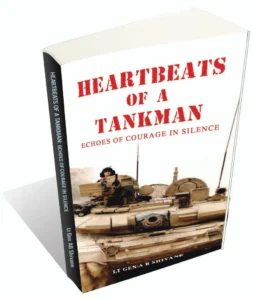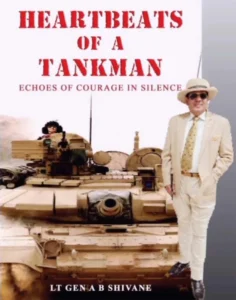
In “Heartbeats of a Tankman,” retired military officer Lt Gen Ashok Shivane (pen name: Ashok Tankman) unveils a captivating collection of poems that transcend the ordinary, delving into the profound world of a soldier’s experiences. Through heartfelt verses crafted during the COVID-19 hiatus, Tankman offers readers a rare glimpse into the soul-stirring journey of a soldier, celebrating sacrifice, valour, love, and the indomitable human spirit. Whether you have a personal connection to the military or simply appreciate the beauty of poetry, this collection promises to leave a lasting impact on your heart and mind. Ashok Tankman’s debut into the world of poetry is nothing short of extraordinary, marking him as a poet of immense talent and insight.
Tankman weaves together themes of family heritage, brave battles, love, destiny, and humanity, providing readers with an immersive experience that resonates deeply with the human condition. Whether reflecting on the legacy of Chhatrapati Shivaji Maharaj, paying homage to the gallantry of soldiers at Haifa, or celebrating the bonds of camaraderie among tankmen, Tankman’s poems evoke emotions and insights that are both profound and relatable.
Each poem in the collection is accompanied by Hindi couplets and insightful abstracts, creating a visually engaging experience that enhances the reader’s connection to the emotions conveyed in the verses.
Throughout the book, Tankman’s sensitivity to the human aspects of soldiering shines through, underscoring the profound impact that military service has on the individual and their relationships. Whether exploring the bonds between father and son, husband and wife, or comrades in arms, Tankman’s poems resonate with authenticity and heartfelt emotion.
Profound influence of family and military service
In “My Life’s Journey Called Fauj,” the poet’s reverence for the uniform is palpable, echoing the sentiments of generations of soldiers who have dedicated their lives to serving their nation. From the very outset, the poet establishes a deep connection to the military life, describing it as an intrinsic part of their being. This sentiment is beautifully captured in the phrase “I am just a soldier who had the good fortune to walk astride many great soldiers in my journey called Fauj.” Here, the poet not only acknowledges their own journey but also pays homage to the countless individuals who have shared similar paths.
The narrative is rich with personal anecdotes and reflections, offering glimpses into the poet’s upbringing, family history, and the formative experiences that shaped their life and values. Through vivid descriptions and heartfelt recollections, the reader is transported to different chapters of the poet’s life, from their early years as a “Fauji brat” to their distinguished career in the military. The poet’s reverence for his parents, particularly his father, a decorated soldier whose legacy looms large, adds depth and poignancy to the narrative. The anecdotes shared about his father’s experiences during World War II and the impact of his leadership qualities underscore the profound influence of parental guidance and the military ethos on the poet’s own journey.
The theme of sacrifice and resilience is further explored through the poet’s personal losses, notably the tragic death of his brother, a young soldier who made the ultimate sacrifice in service to the nation. This serves as a poignant reminder of the inherent risks and sacrifices associated with military life, as well as the enduring bond of brotherhood that transcends mortality. The poem dedicated to the poet’s brother, “My Soldier.. My Braveheart.. My Brother,” eloquently captures the essence of sacrifice and valour, paying homage to a life cut short in the line of duty.
In addition to personal anecdotes, the narrative also reflects on broader themes such as national pride, duty, and the profound sense of camaraderie that defines the military community. The poet’s reflections on their own military career, from their formative years at the National Defence Academy to their eventual retirement as a decorated officer, provide insights into the challenges and triumphs of a life dedicated to service. The narrative is imbued with a deep sense of duty and reverence for the uniform, encapsulated in the poet’s declaration: “Though I no longer don the uniform, it remains an indelible part of my eternal soul, and so I proudly call myself a ‘Soldier4Life.’”
Echoes of the Past
Through evocative descriptions and poignant anecdotes, the poet vividly portrays the rich tapestry of his family history, from his parents’ inter-caste love story to the tragic events of Partition that shaped his family’s destiny. The Haveli in Lahore, once a symbol of prosperity and togetherness, becomes a poignant metaphor for the transient nature of life and the enduring power of memory. The poem “Echoes of Ruins Once Home” beautifully encapsulates this theme, evoking the nostalgia and melancholy of a bygone era while celebrating the resilience of the human spirit.
Whether recounting their father’s distinguished military career or his mother’s unwavering support and resilience in the face of personal tragedy, the poet pays homage to the profound influence of parental guidance and love on their own life journey. The poems dedicated to his parents, “Ode to My Soldier, My Father, My Best Friend” and “An Angel Called Mitra – My Loving Mom,” eloquently capture the essence of familial love and legacy, celebrating the enduring bonds that transcend time and space.
Siblings and Sisterhood
The narrative also celebrates the bonds of siblinghood and sisterhood, highlighting the profound influence of the poet’s siblings, particularly his sister, on his life and values. Through heartfelt anecdotes and reflections, the poet pays homage to his sister’s role as a friend, confidante, and guiding light, emphasising the enduring nature of their bond despite the passage of time. The poem “Sister: My Guiding Light” beautifully encapsulates the essence of this bond, celebrating the shared memories, love, and support that define the sibling relationship.
Love and Partnership
The narrative explores the theme of love and partnership, tracing the poet’s journey from bachelorhood to marriage and family life. Through personal anecdotes and reflections, the poet celebrates the transformative power of love and companionship, highlighting the joys and challenges of building a life together. The poem “A Love Called Shalini” beautifully encapsulates the essence of this journey, celebrating the bond of love and devotion that sustains the poet through life’s trials and tribulations.
The Radiant Legacy of Chhatrapati Shivaji Maharaj
The tribute to Chhatrapati Shivaji Maharaj beautifully captures the essence of his remarkable life journey, from his early conquests to his enduring legacy as a symbol of courage and leadership. The poem eloquently portrays Shivaji’s unwavering commitment to justice, equality, and secularism, underscoring his pivotal role in shaping the course of history. Through vivid imagery and evocative language, the poet pays homage to the indomitable spirit of this great Maratha warrior-king, celebrating his enduring impact on Indian culture and society.
Echoes of Saragarhi
The poetic tribute to the Battle of Saragarhi poignantly commemorates the heroic stand of twenty-one valiant soldiers against overwhelming odds. The poem vividly portrays the courage, loyalty, and sacrifice of these brave warriors, echoing their valorous spirit across time.
Valour at Haifa
The Battle of Haifa pays homage to the remarkable bravery and prowess of the Indian cavalrymen who played a pivotal role in this historic engagement. The poem beautifully captures the gallantry and sacrifice of these brave soldiers as they mounted a daring charge against formidable foes, overcoming insurmountable odds to secure victory on the battlefield.
Wails of Jallianwala Walls
The poignant tribute to the Jallianwala Bagh massacre powerfully captures the tragedy and anguish of that fateful day in Amritsar. The poem hauntingly portrays the horror and brutality of the massacre, honouring the memory of those who lost their lives while igniting a flame of remembrance and resolve in the hearts of readers. Through emotive language and evocative imagery, he pays tribute to the brave souls who sacrificed everything in the pursuit of freedom, ensuring that their voices continue to echo through the corridors of history.

Ode to the Azad Hind Fauj
The tribute to the Azad Hind Fauj poignantly commemorates the sacrifices and contributions of these unsung heroes of India’s struggle for independence. The poem eloquently captures the spirit of patriotism and selfless devotion that inspired soldiers to join Netaji Subhas Chandra Bose’s movement.
Brave Hearts of India
The tribute to Bhagat Singh, Sukhdev Thapar, and Shivaram Rajguru eloquently honours the sacrifices and contributions of these iconic figures in India’s freedom struggle. The poem portrays their unwavering resolve, courage, and dedication to the cause of liberty, celebrating their enduring legacy as symbols of patriotism and inspiration.
The recounting of the Battle of Zojila and the role of the 7th Light Cavalry is a stirring reminder of the bravery and ingenuity displayed by Indian forces in the face of adversity. Similarly, the tribute to the guardians of the tricolour honours the Indian Army’s legacy of service and sacrifice, symbolising the pride and strength of the nation.
The poem reflecting on the love of the uniform poignantly captures the deep connection soldiers feel to their service and the sacrifices they make for their country. The tribute to tankmen mentors acknowledges the importance of guidance and camaraderie in shaping the lives of soldiers.
The poet captures the camaraderie, sacrifice, and indomitable spirit of soldiers in different contexts, from the nostalgic reminiscences of NDA days to the heroic tales of the Kargil War and the recent skirmishes at Galwan.
From “Balidaan: Ode to The Brave Hearts of Rajouri” to “The Echoes of Elusive Peace,” each poem reflects the reality of the world we live in, highlighting both the struggles and the resilience of the human spirit. “The Fallen Soldier” pays tribute to those who have made the ultimate sacrifice for their nation, while “Echoes of a Vanishing Eden” reminds us of the urgent need to address environmental degradation.
“Cheers to our Girlfriends and Wives……May they Never Meet” adds a touch of humour to the collection, offering a light-hearted perspective on relationships and life’s complexities. Meanwhile, “Age is Just a Funny Number” celebrates the vitality of the human spirit regardless of age.
In addition to honouring the soldier’s journey, “Heartbeats of a Tankman” pays homage to the timeless wisdom of the Bhagavad Gita, with the poet reflecting on the sacred text’s enduring message of duty, self-realisation, and spiritual enlightenment. This fusion of military experiences with spiritual insights adds depth and richness to the collection, offering readers a holistic perspective on life’s journey. The poem, “Celebrating Lord Krishna’s Divine Birth” brings a spiritual dimension to the collection, honouring the birth of Lord Krishna and the timeless wisdom found in the Bhagavad Gita.
The concluding verse from the Bhagavad Gita adds a touch of spiritual resonance, reminding us of the divine presence that guides us on our journey through life.
Overall, the collection is a testament to the depth of Lt Gen Ashok Shivane’s soulful exploration and his commitment to sharing wisdom and inspiration with others.
–The writer is a senior journalist and Consulting Editor of Raksha Anirveda















